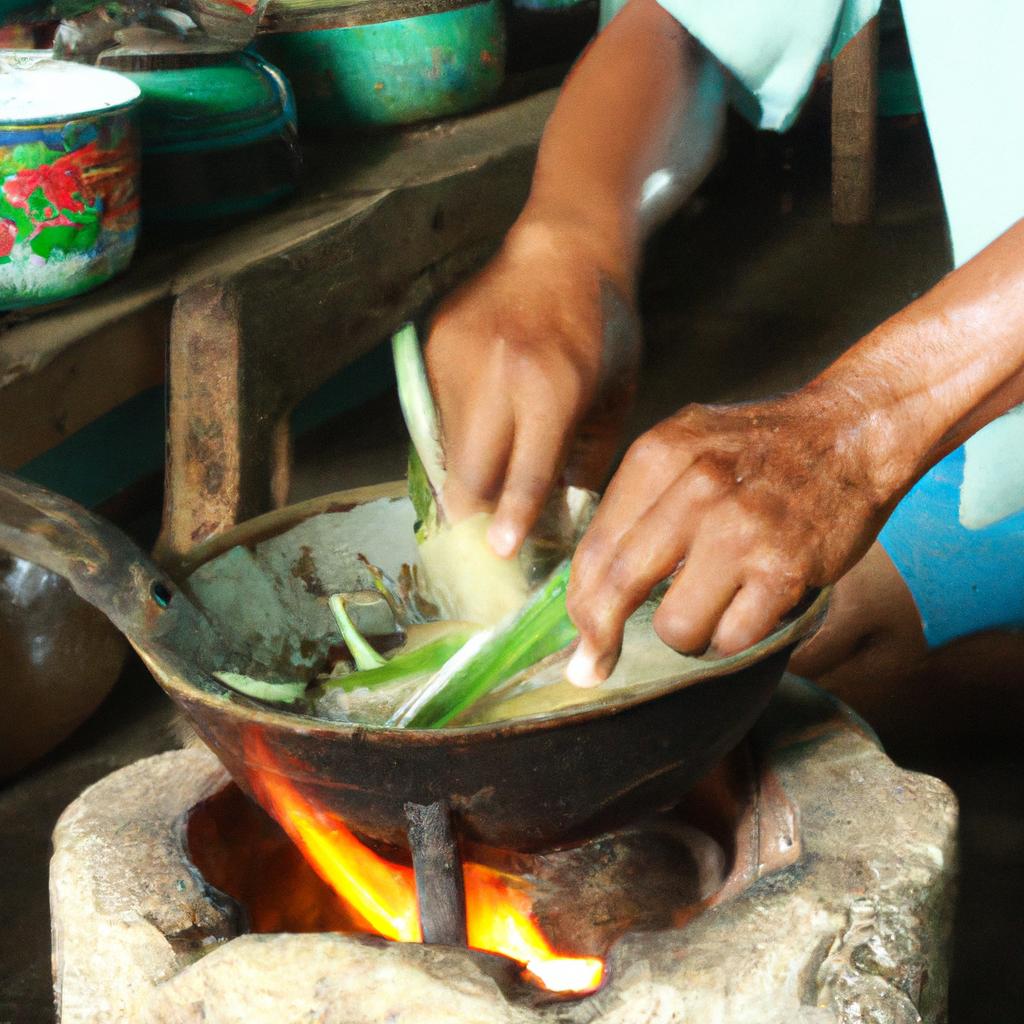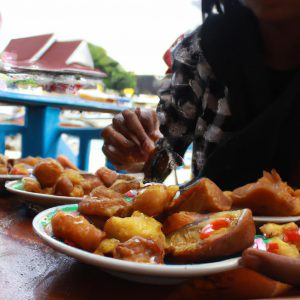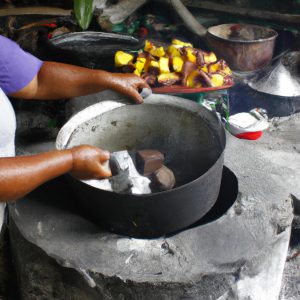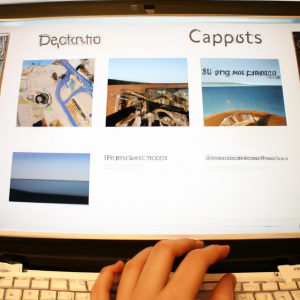Cooking Classes: Discover Authentic Local Cuisine in Travel Directory

Cooking classes have become a popular activity for travelers seeking to delve deeper into the local culture and cuisine of their destination. In recent years, travel directories have emerged as valuable resources for individuals looking to find authentic cooking classes in various locations around the world. These directories provide comprehensive information about cooking class providers, including details on the type of cuisine offered, instructor expertise, and customer reviews. For instance, imagine a traveler visiting Italy who wishes to learn how to make traditional handmade pasta. By consulting a travel directory specialized in culinary experiences, they can easily locate reputable cooking classes that offer hands-on instruction from expert chefs.
The rise of travel directories catering specifically to cooking classes has transformed the way individuals plan their culinary adventures abroad. Instead of relying solely on word-of-mouth recommendations or chance encounters with locals, travelers now have access to an extensive database of carefully curated cooking classes conveniently organized by location and cuisine type. This not only saves time but also ensures that participants are engaging with reliable instructors who possess deep knowledge of regional dishes and techniques.
Moreover, these travel directories allow users to read unbiased customer reviews, enabling them to make informed decisions when selecting a cooking class provider. Through these reviews, aspiring cooks can gain insights into the quality of instruction, overall experience, and value for money. They can also learn about the specific dishes that were taught, the level of hands-on participation, and any additional amenities or services provided during the class. This valuable feedback from past participants helps prospective students gauge whether a particular cooking class aligns with their preferences and expectations.
Additionally, travel directories often provide detailed information about the instructors themselves, including their culinary background, professional experience, and areas of expertise. This allows travelers to choose classes led by chefs who specialize in the cuisine they are most interested in learning about. Whether it’s mastering Thai street food or perfecting French pastry techniques, these directories ensure that participants are learning from knowledgeable instructors who can offer authentic insights into local culinary traditions.
Overall, travel directories for cooking classes have revolutionized how we approach culinary tourism. By providing a comprehensive database of reputable cooking classes worldwide, along with customer reviews and instructor profiles, these directories empower travelers to make informed decisions and maximize their cultural immersion through immersive culinary experiences.
Cooking classes: What to expect and why they are a must-try
Cooking classes have become increasingly popular among travelers seeking unique and immersive experiences. Whether you are a seasoned chef or an amateur cook, these classes offer an opportunity to delve into the culinary traditions of different regions and learn from local experts. By participating in cooking classes, you not only gain valuable skills but also get a taste of authentic local cuisine.
To illustrate the importance of cooking classes, let’s consider the case of Sarah, a food enthusiast who recently traveled to Italy. During her trip, she decided to take a cooking class in Tuscany where she learned how to make traditional pasta from scratch. Through hands-on experience and guidance from a local chef, Sarah discovered the intricacies involved in making fresh pasta dough and crafting various shapes like tortellini and fettuccine. This experience allowed her to develop a deeper appreciation for Italian culture and its rich gastronomic heritage.
Engaging in cooking classes offers several benefits that go beyond just learning recipes. First, it provides an avenue for cultural exchange as participants interact with local chefs who share their knowledge and expertise. These instructors often have extensive experience passed down through generations, allowing them to provide insights into regional ingredients, techniques, and flavor combinations unique to their area.
Secondly, cooking classes promote sustainability by highlighting the use of locally sourced ingredients. Many chefs emphasize the importance of utilizing seasonal produce and supporting small-scale farmers. Participants learn about the significance of using fresh ingredients while reducing their carbon footprint by opting for locally grown products.
Furthermore, attending cooking classes can be an enjoyable social activity that fosters connections with fellow participants. The shared experience of working together towards a common goal creates opportunities for interaction and camaraderie amongst individuals from diverse backgrounds united by their love for food.
In conclusion [Transition], taking part in cooking classes allows travelers like Sarah to explore the depths of regional cuisine while gaining practical skills under the guidance of expert locals. In our subsequent section on “Benefits of learning regional dishes from local chefs,” we will further explore the advantages of engaging in these classes and how they contribute to a more enriching travel experience.
Benefits of learning regional dishes from local chefs
Transitioning from the previous section that highlighted the importance of cooking classes, let us delve deeper into the enriching experience they offer. To better understand their value, consider this example: imagine yourself in a quaint Italian village, surrounded by picturesque landscapes and charming locals. As you join a local chef for a hands-on cooking class, you learn to prepare traditional dishes like homemade pasta paired with rich tomato sauce. This immersive culinary encounter not only enhances your travel experience but also provides an authentic taste of the region’s gastronomic heritage.
Participating in cooking classes can be an enthralling adventure that allows travelers to explore diverse culinary traditions. Here are some key reasons why these experiences have become increasingly popular among both tourists and food enthusiasts:
-
Cultural Immersion: Cooking classes provide a unique opportunity to immerse oneself in the local culture through its flavors and techniques. By learning directly from passionate regional chefs who possess deep knowledge about their cuisine, participants gain valuable insights into the history, customs, and values associated with each dish.
-
Hands-On Learning: Unlike simply sampling local delicacies at restaurants, cooking classes enable individuals to actively engage in preparing meals themselves. From selecting fresh ingredients at bustling markets to mastering age-old recipes handed down through generations, students acquire practical skills while honing their understanding of traditional cooking methods.
-
Social Connection: Joining a cooking class fosters social interaction as participants work together towards a common goal – creating delicious meals. Whether traveling alone or with companions, it offers an excellent platform for meeting fellow food lovers from different walks of life and forging new friendships over shared interests.
-
Lasting Memories: The memories created during a cooking class often endure long after one returns home. Beyond merely eating great food, participants take away newfound knowledge and skills that can be replicated in their own kitchens—a delightful reminder of their unforgettable travels.
Table Example:
| Benefit of Cooking Classes | Description |
|---|---|
| Enhanced cultural understanding | Immerse yourself in the customs, traditions, and history associated with regional cuisines. |
| Practical hands-on experience | Learn to prepare traditional dishes using local ingredients and techniques from expert chefs. |
| Social interaction | Connect with like-minded individuals who share a passion for food and culinary exploration. |
| Lasting memories | Create unforgettable experiences that extend beyond your journey through knowledge gained during cooking classes. |
By participating in these immersive culinary experiences, travelers can truly embrace the essence of each destination they visit. In our next section, we will explore some of the top destinations renowned for offering exceptional opportunities to engage in authentic cooking classes.
As we continue our exploration into the world of immersive culinary experiences, let us now turn our attention to the top destinations where one can indulge in captivating cooking classes.
Top destinations for immersive culinary experiences
Discovering the unique flavors and techniques of a region’s cuisine can be an enriching experience for any traveler. By participating in cooking classes taught by local chefs, you not only gain practical skills but also immerse yourself in the cultural heritage of the destination. Let us explore some top destinations where you can embark on this culinary journey.
Imagine yourself in Tuscany, Italy, surrounded by rolling vineyards and picturesque landscapes. As part of your travel itinerary, you decide to join a cooking class led by a passionate Italian chef. Through hands-on instruction, you learn how to prepare traditional dishes like homemade pasta and authentic pizza dough. The class takes place in a rustic farmhouse kitchen, creating an intimate setting that allows for personalized guidance from the experienced chef. By learning directly from locals, you gain insights into their culinary traditions and regional ingredients, resulting in a deeper appreciation for Tuscan cuisine.
Embarking on a culinary adventure through cooking classes offers several benefits that enhance your overall travel experience:
- Cultural immersion: Engaging with local chefs provides an opportunity to interact with residents who are deeply connected to their food culture. You’ll learn about traditional cooking methods passed down through generations and understand how food plays an integral role in daily life.
- Authenticity: Cooking classes allow you to taste and create dishes using locally sourced ingredients specific to the region. From visiting bustling markets to picking fresh herbs from herb gardens, these experiences enable you to truly savor the essence of the local cuisine.
- Skill development: Learning new recipes and honing your culinary skills under expert guidance enables personal growth as well-rounded home cooks or aspiring chefs.
- Social connection: Participating in group cooking sessions fosters camaraderie among fellow travelers sharing a common interest. It creates opportunities for cultural exchange and friendships that may last beyond the duration of the class.
To further illustrate the diversity of immersive culinary experiences available worldwide, consider this table showcasing different destinations known for their exceptional cooking classes:
| Destination | Cuisine Specialties | Notable Dish |
|---|---|---|
| Thailand | Thai cuisine | Pad Thai |
| Japan | Sushi and sashimi | Ramen |
| Mexico | Mexican cuisine | Tacos al Pastor |
| Morocco | Moroccan cuisine | Tagine |
By engaging in cooking classes during your travels, you unlock a deeper connection with the destination’s culture and its people. The next section will delve into how these culinary experiences can enhance not only your gastronomic journey but also your overall travel experience. So let us explore how cooking classes can enrich your time spent exploring new destinations.
How cooking classes can enhance your travel experience
Uncover the Richness of Authentic Local Cuisine through Cooking Classes
Imagine yourself strolling through the bustling streets of Bangkok, overwhelmed by the aroma of exotic spices and sizzling street food. As a traveler seeking more than just sightseeing, you yearn to delve deeper into the local culture and truly connect with your destination. One way to achieve this is by participating in cooking classes that offer an immersive culinary experience.
Cooking classes are not only about learning recipes; they provide opportunities for travelers to gain insights into the cultural heritage and traditions associated with regional dishes. Let’s consider a case study: In Florence, Italy, renowned for its delectable pasta and mouthwatering gelato, visitors can join cooking workshops where expert chefs unveil the secrets behind classic Tuscan recipes. A typical class starts with a visit to local markets, offering participants an opportunity to handpick fresh ingredients while observing locals engaging in their daily routines. This hands-on experience sets the stage for an authentic encounter with Florentine cuisine.
To fully appreciate how cooking classes enhance travel experiences, let us explore some key benefits:
- Cultural immersion: By actively participating in cooking classes, you engage in communal activities that bridge language barriers and foster connections between fellow travelers and locals.
- Culinary skills development: These sessions are designed to teach both novices and seasoned home cooks essential techniques specific to each region’s cuisine.
- Insight into traditional practices: From mastering age-old preservation methods to understanding the significance of certain ingredients, these classes shed light on customs passed down from generation to generation.
- Unique souvenirs: Instead of purchasing mass-produced trinkets, attending a cooking class offers you something far more valuable – knowledge that will stay with you long after your trip ends.
Consider this table showcasing different destinations known for their remarkable cooking classes:
| Destination | Signature Dish | Notable Ingredients | Traditional Techniques |
|---|---|---|---|
| Thailand | Pad Thai | Lemongrass, Tamarind | Wok Stir-Frying |
| Morocco | Tagine | Cumin, Saffron | Slow Cooking |
| Japan | Sushi | Nori, Wasabi | Rice Rolling |
| Mexico | Guacamole | Avocado, Lime Juice | Mortar and Pestle Grinding |
In conclusion to this section about cooking classes’ ability to enhance travel experiences, participating in these culinary adventures allows you to gain a deeper understanding of the local culture while honing your skills in preparing authentic dishes. Next, we will explore how these classes can unveil the secrets behind traditional recipes and provide insight into the rich history that shaped them. Let’s embark on an appetizing journey together as we uncover the treasures hidden within each mouthwatering recipe.
Uncovering the secrets of traditional recipes
Imagine yourself in a small village nestled in the heart of Italy, surrounded by rolling hills and vineyards. You have just signed up for a cooking class to learn how to make authentic Italian pasta from scratch. As you step into the rustic kitchen, you are greeted with warm smiles and the aroma of fresh herbs filling the air. This is where your culinary journey begins, taking you deep into the world of traditional recipes passed down through generations.
Exploring local cuisine goes beyond satisfying your taste buds; it offers a unique opportunity to uncover the secrets behind beloved dishes. By participating in cooking classes during your travels, you gain insights into regional ingredients, cooking techniques, and cultural traditions that shape each dish’s distinct flavors.
Here are some compelling reasons why delving into traditional recipes through cooking classes can be an enriching experience:
- Immerse yourself in local culture: Cooking classes provide an immersive way to connect with locals and their customs. Through hands-on experiences guided by passionate instructors, you not only learn about food but also gain insights into the history, stories, and values associated with different dishes.
- Expand your culinary repertoire: Whether it’s mastering the art of sushi-making in Japan or learning secret spice blends used in Indian curries, cooking classes expose you to new flavors and techniques that broaden your culinary horizons. These newfound skills can later be recreated at home, allowing you to relive cherished memories from your travels.
- Preserve gastronomic heritage: Traditional recipes often represent centuries-old gastronomic traditions that have been handed down through generations. By actively engaging in these cooking classes abroad, you contribute to preserving these ancient practices while gaining a deeper appreciation for their significance.
- Foster cross-cultural understanding: Breaking bread together has long been recognized as a means to foster connections between people from diverse backgrounds. Participating in cooking classes provides opportunities for cultural exchange and dialogue as you interact with fellow participants hailing from different parts of the world.
To illustrate the significance of cooking classes in uncovering traditional recipes, consider this table showcasing various dishes and their associated cultural elements:
| Dish | Country | Cultural Significance |
|---|---|---|
| Paella | Spain | Symbolizes communal dining and celebration |
| Pad Thai | Thailand | Reflects the balance of sweet, sour, salty, and spicy flavors |
| Kimchi | South Korea | Represents preservation techniques and community bonding |
| Couscous | Morocco | Showcases the artistry of steaming semolina grains |
By participating in cooking classes abroad, you not only learn how to prepare these iconic dishes but also gain a deeper understanding of the cultural values intertwined with them.
As you embark on your journey to explore traditional recipes through cooking classes, it is essential to find and choose the best options. In the following section, we will provide tips on selecting reputable cooking classes that align with your preferences and expectations. So let’s delve into finding culinary gems around the globe!
Tips for finding and choosing the best cooking classes abroad
Uncovering the secrets of traditional recipes has undoubtedly piqued your interest in exploring cooking classes abroad. Now, let us delve into some practical tips for finding and choosing the best options available.
Imagine you are planning a trip to Italy and have always been fascinated by its rich culinary heritage. You decide that taking a cooking class would be an excellent opportunity to immerse yourself in authentic Italian cuisine. To begin your search for the perfect cooking class, consider these key factors:
- Location: Start by researching locations known for their culinary traditions, such as Tuscany or Emilia-Romagna regions in Italy. These areas often offer a wide variety of cooking classes taught by local chefs who possess extensive knowledge of regional dishes.
- Class Structure: Look for courses that provide hands-on experience rather than just demonstrations. Practical sessions allow you to actively participate in preparing dishes from scratch, ensuring a more immersive learning experience.
- Small Class Size: Opt for smaller group sizes to ensure personalized attention from instructors. This way, you can ask questions, seek guidance, and receive valuable feedback throughout the course.
- Authenticity: Seek out classes that emphasize using locally sourced ingredients and traditional cooking techniques. Learning from seasoned professionals who prioritize preserving cultural authenticity will enable you to gain insights into the true essence of the cuisine.
To further assist you in evaluating different options, here is a comparison table showcasing three popular cooking schools across various aspects:
| Cooking School | Location | Class Size | Emphasis on Local Ingredients |
|---|---|---|---|
| Taste of Sicily | Sicily | Small groups | High |
| The Culinary Loft | Paris | Medium-sized | Moderate |
| Thai Flavors | Bangkok | Large | Low |
By considering these factors and analyzing this table, you can make an informed decision based on your preferences and desired learning experience.
In conclusion, choosing the right cooking class abroad involves considering factors such as location, class structure, small group sizes, and an emphasis on authenticity. By following these guidelines and conducting thorough research, you can ensure that your culinary journey is not only educational but also a memorable one. So start planning now and embark on a gastronomic adventure like no other!







